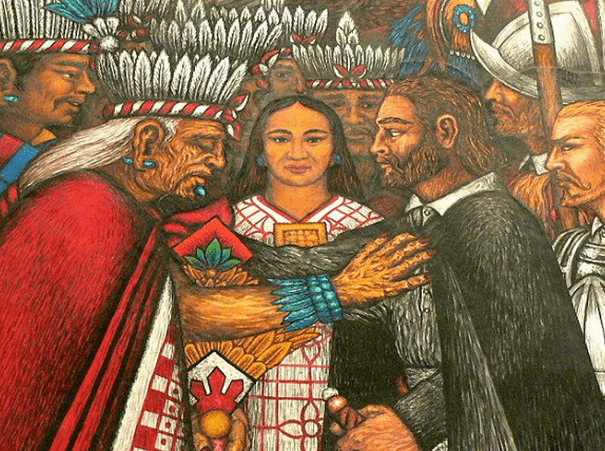Winner of the Fall 2016 StMU History Media Award for
Best Article in the Category of “People”
Best Article in the Category of “World History”
Largely due to the importation of disease and use of superior weapons, the Spaniards were able to conquer the Aztec capital of Tenochtitlan, kill the empire’s last emperor, Cuauhtémoc, and bring the Aztec empire to an end. Few know of La Malinche, the indigenous interpreter of Hernán Cortés, whose linguistic abilities were used to facilitate important conversations between the Spaniards and the indigenous leaders. Without the help of La Malinche, perhaps the Aztec empire would have survived.
Born between 1502 and 1505, La Malinche was named Malinalli Tenepal, the first part of her name being a Nahuatl term for the twelfth day of the month in correspondence to the Aztec calendar, and the second part of her name meaning “lively.” She was born of nobility in Paynala within the region of Veracruz. Her troubles started at a young age after the death of her father. La Malinche was ousted from her home to ensure her new half-brother received the inheritance of the family instead of her, since she was the eldest child. She was given to “some Indians of Xicalango.”1 Then the Indians gave her to a nobleman in Tobasco, a region in the Yucatan. When Cortés arrived to Tobasco, he was offered twenty slaves, one of them being La Malinche. Having lived in Veracruz, a Nahuatl-speaking region, and then being sold into a Maya-speaking region, La Malinche knew both languages and she was soon recognized for the linguistic talents that could benefit Cortés in his conquests.2

The few glimpses of La Malinche and how her presence as an interpreter accelerated the fall of the Aztec empire can be found in the writings of the Spanish explorers, specifically from Hernán Cortés, her “lord and master.”3 From the second letter Hernán Cortés wrote to Emperor Charles V, dated October 30, 1530, Cortés speaks of La Malinche as “a female interpreter that I had, who was a native of this country, and whom I obtained at Putunchún on the Rio Grande.”4 This confirms the vague aspects of her life that we already know. But most importantly, in this context, this letter goes on to tell of a scenario in which La Malinche saved the Spaniards from an ambush by the Cholulans. La Malinche was told by the wife of a native leader that they planned to attack the Spaniards and if La Malinche came with them, she would be protected. La Malinche delivered this message to Cortés, which ultimately led to the massacre of Cholula and provided a direct path to march towards Tenochitlan, the capital of the Aztec empire.5 This leads to the question of whether or not La Malinche was a traitor or a survivor. Did she explicitly want the Aztec empire to fall or did she just want to save herself from the carnage?
With no traces of primary sources from La Malinche herself, her story has been retold by various scholars without much consistency, nothing ever being certain. Up until the twentieth century, La Malinche was viewed as a traitor to her country Mexico. In 1861, on the celebration day of Mexico’s Independence, Ignacio “El Nigromante” Ramírez, a Mexican journalist, addressed the Mexican people by saying, “One of the mysteries of fate is that every Mexican owes his downfall and disgrace to a woman, and to another woman his salvation and glory; the myth of Eve and Mary is reproduced everywhere; we indignantly remember Cortés’s mistress and will never forget, in our gratitude to Doña María Josefa Ortiz.”6 La Malinche is seen as playing a key role in the subjugation of the Mexican peoples to Spain, while Doña María Josefa Ortiz did the contrary and liberated the country. However, many Chicana writers and modern scholars are trying to rewrite the tale of La Malinche to understand the complexities of her choices and to vindicate her. For example, Gloria Anzaldua promotes the idea that La Malinche had a “new consciousness,” that she voluntarily served as the interpreter of Cortés not only to save herself, but also because she knew that a new mestiza culture was going to be born (especially considering she had a son with Cortés in 1524).7 She made a conscious effort to exchange language and cultural aspects from each side in order to facilitate the emergence of the new mestiza society; however, with that came brutal consequences in the shape of warfare and mass death in the New World.
Whether or not La Malinche’s role as Cortés’s interpreter was traitorous, simply an effort to survive, or some other complex reason involving love for Cortés, hate for the Aztec empire for the cruelty she faced after being ousted from her home, or promotion of the new mestiza culture, no one will ever know the true story of the Indian, slave woman who traveled alongside Cortés towards the culmination of the Aztec empire.
- Bernal Castillo del Díaz, The Discovery and Conquest of Mexico, 1517-1521 rev. American ed., trans. A.P. Maudsley (New York: The Noonday Press, 1965), chap. 22-23. ↵
- Pilar Godayol, “Malintzin/ La Malinche/ Doña Marina: re-reading the myth of the treacherous translator,” Journal of Iberian and Latin American Studies 18, no. 1 (April 2012): 61-68. ↵
- Castillo del Bernal, chap 23. ↵
- Hernan Cortes to Emperor Charles V, October 30, 1520, in Letters of Despatches of Hernando Cortes, to the Emperor Charles V., trans. (New York: Wiley and Putnam, 1843), letter II. ↵
- Hernan Cortes to Emperor Charles V, October 30, 1520, in Letters of Despatches of Hernando Cortes, to the Emperor Charles V, letter II. ↵
- Rosario Pérez-Lagunes, “The Myth of La Malinche: From the Chronicles to Modern Mexican Theater” (PhD dis., Virginia Polytechnic Institute and State University, 2001), 24. Although she was of Spanish descent, Doña María Josefa Ortiz was born in Valladolid, Mexico in 1768 and identified herself as Mexican. She and her husband were both a part of the rebellion that ultimately led to Mexico’s independence from Spain in 1824. ↵
- Godayol, 68-70. ↵



230 comments
Adrianna Hernandez
I find it interesting how just one woman was able to use her skills to bring down the Aztec empire. It’s crazy to think that if she had helped Cortez just to have revenge due to her life circumstances. I liked how the article added both perspectives of those who respect or disagree with the view of La Malinche’s decisions. Its crazy how she was abandoned by family and sold into slavery.
Daniel Gimena
I think the story of this woman thrilling. La Maliche is seen by some people in Mexico as a traitor because they say she betrayed her country by letting Hernan Cortes know about Aztecs’ idea of attacking the Spaniards. On the other hand, some people and historians simply see her as a survivor, because she was sent to exile and had to live by her own. They argue that Hernan Cortes offered protection to her, and she just survived by doing what she was asked to do. In my personal opinion, I can understand Malinalli’s actions, as I think that most people would have acted like her if they had nothing left that still linked her to her people, as she had been treated bad by them. At the threat of a powerful army like the Spanish, and with the opportunity to get a better life for her and her children, I think most people would have acted like her. .
Alyssa Ramos
This is an amazing article that captured both sides of those who respected La Malinche and those who believed she was a traitor. It is interesting to see how a woman played a part in the fall of the Aztec Empire. I believe she used her power, as the indigenous interpreter of Hernán Cortés, as a chance to survive more than for revenge. It is upsetting no one will ever know the true story of La Malinche, because I believe her story has the right to be told truthfully.
Reagan Clark
When learning about this part of history, I have never heard about La Malinche. This was a fascinating article. Her actions led to the subjugation of the Mexican peoples. I wonder what made her do this. She clearly was not treated well by her people before Cortes appeared. Maybe this was her revenge. Regardless, her actions helped shape the colonies and the Aztec empire.
Kayla Mendez
I really liked that the article included perspectives from both sides, those who respect La Malinche’s decisions and those who viewed them as disgraceful. Sadly, she’ll never be able to tell her own story, but I believe she wouldn’t state any type of regret towards them. Whatever reasoning was behind her actions, they were aligned with her beliefs and that cannot be changed. She was abandoned by her family, and sold as a slave, so her belonging to the Aztec Empire already seemed unstable. At least she was able to find purpose in her life as a translator between different tongues and cultures, rather than living the rest of her life as a meaningless servant.
Kendall Guajardo
I think its such interesting information that a women had such a prominent part in the fall of the Aztec Empire. The speculation surrounding her motivations for telling Cortes this information is quite interesting but perhaps the role she played wasn’t as malicious as it seems. In another way, I also think we should consider the possibility that she felt called to be loyal to Cortes and the Spaniards. The downplay of her own self motivations is telling because as a women they feel as though they were subjected from only external influence, when perhaps she was quite internalized and impassioned with her “betrayal” so to speak. More background history on a woman’s role in society at the time is probably the reason scholars have noted her to most likely be afraid more than vengeful/loyal to the Spaniards.
Anthony Coronado
While reading this article, I was quick to refer to that of the Lewis and Clark expedition. As with this expedition they had help of Sacagawea. This story sounds like very similar conflicts that seem to arise with cultures and the risk of explorers to venture into territory that is resilient to the explorers but is common to natives of the land.
Nathaniel Bielawski
I think that La Malinche used her linguistic abilities to exchange information between both sides of the conflict, perhaps to hopefully make peace. Although she might have accelerated the downfall of the Aztec empire, I think it was inevitable that Cortez would conquer it (he was a Conquistador after all).
Sofia Almanzan
Great Article. I had never heard of La Malinche before. I think she is a true testament to the power a woman can hold when given the chance and a testament to what a woman will do to survive. It is very sad that she was put in this situation in the first place but I think she did what she did to survive.
Sara Guerrero
After reading this publication I think that La Malinche was influenced to go against her native blood because of the way she was treated. La Malinche had it bad from the start with her not inheriting her parents fortune and being sold from Indiand to noblemen. I found it intriguing that Cortes saw the potential of her and took advantage of the situation for his own benefit. It worked out in the end cause he was able to take down one of the largest and greatest empires in the new world.